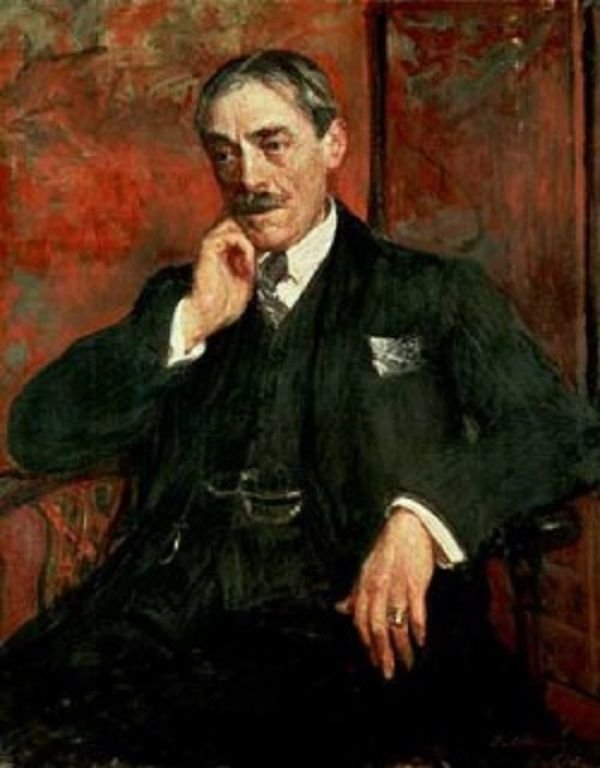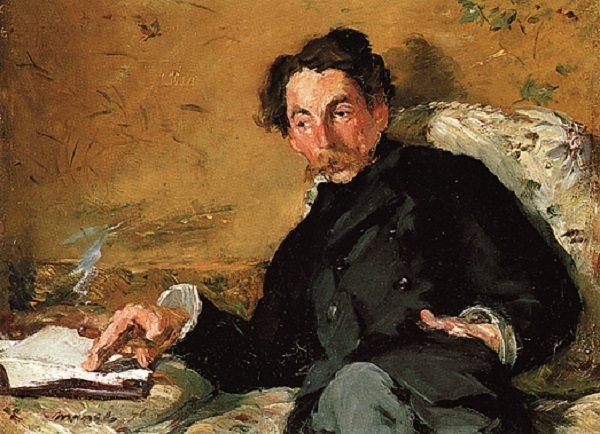Stefan Mallarme throught the eyes of Paul Valeri
There are essays that analyze a work; others penetrate the writer's personal world to explain his artistic visions with the experiences of life; others deal with the impact of literary works on readers and the spiritual movements of time. But there are also essays that represent a conceived love explanation of one creator to another ... This is the case with Paul Valeri's essay "I said sometimes to Stefan Mallarme ..." Strange is the literary fate of Paul Valeri, who lived from 1871 to 1945. A son of a customs officer, he studied law, and as a student he is attracted by the symbolic lyricist of Stefan Mallarme . The prince of the poets has already set up his own school with the famous afghan afternoon, and Paul Valerie is a regular visitor to his "literary evenings." In the spirit of Mallarme , he writes and publishes his first poems, which immediately attract the attention of critics and place him among the most reliable young poets. But on a tumultuous night, Valerie decides to give up his "unclean" poetry and over the next two decades ponder the possibilities of the human intellect. During this period he worked as a clerk in the military ministry and as a private secretary of an influential merchant. Valerie then published his first essay, "Introduction to the Leonardo da Vinci Method", and then a series of self-observations under the title "Evening with Mr. Test". Only in 1917, forty-six, Paul Valeri published his first poetic book, The Young Park, and five years later, his main poem "Charms". Valerie's "pure poetry" is focused on sustainable and self-contained beauty, she is CLEANED by anything accidentally and arbitrarily, tight in a strict set of requirements and rules. Images and associations are subject to the highest harmony that arises from the sophisticated game of the spirit. Alone Valery understands his poetry as a "language in the language," where the less conventional meaning of words, and their associative-musical value, is manifested. This poetry is the result of a conscious process of verbal purification, which returns language to its classical spellbinding power.

For his artistic insights, Paul Valerie is primarily responsible for his great predecessor, Stefan Mallarme . And now, for 60 years, he dedicates to him the famous essay he has today, explaining him in love, but at the same time talking about his own poetics, putting on the image of Mallarme his spiritual portrait. "I said to Stefan Mallarme at times," Valery begins:
Some blame you and others ridicule you. You arouse irritation and pity. Any journalist can easily amuse the world at your expense, and your friends shake their heads. But do you know, do you feel, that in every French city there is a nameless young man who would let himself be hacked to pieces for your poems and yourself?
Paul Valeri notes that Mallarme 's perfection, as well as the unmistakable strangeness of his few works, suggest to their author an idea quite different from the usual notion of the poets, even the significant among them. And while this original work is puzzling, it still captures in the first reading, but also puts the mind in difficulty, intrigues it, causes it to understand. Unlike instant conversion of speech into ideas, it often requires the reader to have very precise intellectual processing and careful repetition of the text. Thus, the reader becomes almost a co-author, and this means striking the tradition, the laziness and every weak intellect. Valerie talks about the art of reading, which is achieved in solitude, away from any noise, art that responds to the creative troubles and longings of the writer with their consistent persistence and patience. For himself, Valerie admits that after Mallarme is no longer able to perceive almost nothing from a book that does not resist him. So even the one who does not struggle with Mallarme 's complicated texts will start to learn to read again. If he wished to give them meaning, worthy of the wonderful form and the efforts these verbal figures had cost to their creator, the reader would undoubtedly have to combine the methodical work of reason and his combining possibilities with poetic delight. Because everything that is capable of appealing to the crowd is carefully sculpted by Mallarme 's work. No eloquence, no narrative, no assertions except too deep, no tingling of banal feelings, no admission of conventional forms, no "too human", which lowers poetry. Mallarme always finds an unexpected utterance, a word that is not attracted to the repetitions and empty exits of natural lyricism. And Paul Valerie continues his glory for Mallarme s genius.

No one can match today with the poet dared to differentiate to such extent the power of speech from his comprehensiveness. No one has clearly distinguished the two consequences of language expression: exposing one fact and generating a soulful thrill. Poetry is a compromise or a known correlation between these two functions ... No one had dared to convey the sacrament of anything through the sacrament of language. Poetry probably refers to some human condition, preceding writing and criticism. Therefore, every real poet has a VERY HUGE man: he still drinks from the first texts of the language; draws poems in almost the same way that the most capable among the primitive people have forged "the words" or the forefathers of the words. Thus, the poetic gift, more or less desirable, is obviously a sign of a nobility, witnessed not by archives proving the trace, but by the old man's ability to feel and respond to the present day. The poets, worthy to be called this, would now be the incarnations of Amphion and Orpheus.Nothing is more noble than Mallarme 's expression, gaze, smile, and silence, entirely devoted to his inmost, high purpose. Everything comes from a supreme and rational principle. Actions, gestures, words, small inventions, wonderful short creations, verses written on various occasions (in which he invariably manifests his rare sophisticated skill), everything is pure, as if in harmony with the deepest essence of man, with his sense of being unique and unique, living only once. This is why his unwavering pursuit of perfection is inevitable.
Once the difficulty of reading and charm has overcome its impact, the perfection of creation becomes more and more tangible. It can not be attributed to anything other than a unique reason: the more they reveal thin speculative hits, formulas and consciously reached depths in Mallarme s texts, even in his most insignificant remarks, the more he stands out as a self- in a lovely serenity and a unique man - the first one. It is not impossible to assume that there have been poets much stronger in their ACTION, but he seems to have the only conscious and full spiritual organization, as evidenced both by his works and by his behavior. " According to Paul Valeri Mallarme , he strongly suggests that there is a whole mental system related to poetry, which is considered, created and recreated continuously as an incomplete creation. For him, poetry is that universal and inaccessible limit to which all poems are pursued, and indeed all arts. Early understood, Mallarme seeks and recognizes the origin of the longing that engenders poetic activity; defines and extracts its pure substance; so he self-examines by masterly touching the strings of his innermost being. This is how, in his essay on Stefan Mallarme , Paul Valerie speaks for himself and his own work, built on the same aspiration for purity and depth, self-discipline and artistic spirits. Alone Valeri - already in first person says that the most wonderful impulse of a man is to turn his disorder into order, and his opportunities in power - that's the real miracle. He like people who are strict to their talent.
Marvelous, esoteric, mystic(?) Mallarmé, you have such good taste in Literature, @godflesh, and so similar to my own :D
Here's a favorite quote of his, I often return to:
To be honest, I really love much more to read someone talk about Mallarmé as Maurice Blancho. Mallarmé is one of this artist which affect me very much, not for the things he writes, but for the things pepolewrites about him. I am still familiar with a few of his letters and poems, but not with all his work, I postpone it for a distant future and I dream more about who he is :)
But yes we have very similar taste. I think the primary source are the same. We bend around irrationalists as Nietzsche, Schopenhauer, and Kierkegaard, and then everything from the past and the future that hovers around them again we finds ourself in it.
Yes, Blanchot's Work of Fire! And, I understand what you mean about the myth of Mallarmé, I was under its spell, too. (I'm curious to know how old you are; if you think it impertinent, I understand)
I think I agree with you about the irrationalists and our primary sources although, as I might have mentioned, I've since moved from that world...
I am 29 years old but I am really asocial guy and in most of the time I read :D
With this irrational spirit I understand you... I think my period is coming to leave it too... and i am really depressed about this premonition :D
Wow, that's pretty amazing you're so young (I thought you were in your late 50s, at least).
Asocial is a given, I was, too, at your age and obsessed the way that you are...
Don't be depressed, maybe it's depression that kept you in this claustrophobic space for this long. Part of growing up (in my experience) is to say goodbye to all these brilliant, damaged thinkers and to find my own voice and philosophy :)
You will look back on this stage of your life, one day, and perhaps wonder what took you so long to break free from their seductive chains. There's Light & Life out there!
That's true and inspiring.
Yes :)
wow,what an amazing writeup!!
True :)
Wow. Thank you for sharing. It's such a tragedy that it seems like intellectualism is just a shadow of what it once was. Art, society, politics, it all used to seem full of the witty and well-read. Now it seems like everyone is all image and no substance.
Wow, I'm thrilled. Still crushing on the art works
Awesome post! I invite you to visit our blog and vote us back! And of course to enjoy our content :)
In the midst of the silent night,
Your bulk ringtones disturbs my reading
While your gallivanting bed spring adds beat to the rhythm
On Saturday morning... https://steemit.com/love/@mattygrace/condom-commando